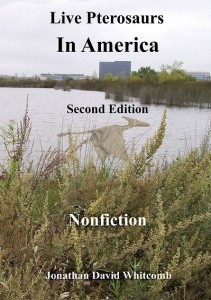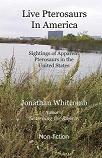“An object regarded with awe as being the embodiment or habitation of a potent spirit or as having magical potency”—that definition of “fetish” almost applies to the philosopohy of strict Naturalism, including the idea of Natural Selection. But the object of that pseudo-religious worship is not a physical object but an idea, including the dogma that all life came into existence without any help from God. Where is the magic? It’s in the belief that small simple life, through “survival of the fittest,” evolved into large complex humans.
Pterosaurs living (though mostly hidden) in modern times—that should cause reevaluation of the foundation of Darwin’s philosophy, for Darwin himself would have thrown out his idea of unlimited common ancestry if he had known what we now know. Over a century after his death, our knowledge of life, including the complexity of even the simplest organisms, surpasses even the wildest imaginations of nineteen-century biologists. But the higher qualities of modern human accomplishment exceed any reasonable naturalistic explanation within the limits of Darwin’s philosophy.
Objective reasoning, for the devout atheist, results in severe problems, including the problem of explaining the higher qualities inherent in modern humans. We have built space vehicles to travel to the moon; humans have walked on the moon. Can anyone justify believing that particles in a puddle of mud would accidentally bump into each other in a way that would eventually create beings that would fly to the moon? How could such beings be completely unlike any gods? (Remember what it says in the New Testament about humans: “Have I not said ‘ye are gods?'”) The higher qualities of modern human intelligence cannot be ignored, for something god-like resides within us.
And what about modern humans preserving endangered species? How similar is that to God preserving species on the Ark of Noah! One problem for atheism is how to acknowledge the noblest human behaviors and still disbelieve that those qualities may exist in a personage more advanced than modern humans. The devout atheist cannot dispute the existence of the head of NASA, just because he has not shaken hands with that person; why dispute the existence of a higher authority?
But how can so many Westerners remain ignorant of the existence of God? They have been blinded by “survival of the fittest.” Where does the truth lie? The general concept of Natural Selection is hardly disputable. The fallacy is in believing it accounts for the existence of humans. Why? Simple organisms survive better than complex ones, therefore more complex ones would have become extinct, replaced by the simpler forms, according to the definition of Natural Selection.
Looking at it from a broad perspective, a planet with its early history including tiny simple microorganisms, over billions of years, would result in a world devoid of any life, for the non-living substances of the planet (sand, water, and rock) survive much better than any form of life. Larger, more-compex organisms would never have competed well with the simpler ones, and so would never have even begun to be established.
Natural Selection, in a universe without any God, does more than make human life impossible: Over billions of years, on a planet that started with some form of life, all life would have become extinct. Because he never looked deeply enough into the ramifications of his philosophy, Darwin never realized that our wonderful planet of life could not exist without the enormous protective efforts of someone with super-human intelligence and power: God
Acknowledgement of extant pterosaurs does not refute general ideas about biological evolution, those limited changes that are obvious. But Darwin himself acknowledged the challenge of “living fossils” to the credibility of his ideas, and we would be wise to encourage a reevaluation of the philosophical foundations of those ideas, in particular how “survival of the fittest” cannot account for the life we now find on this earth.
Advertisement
Live Pterosaurs in America, by Jonathan David Whitcomb, is a nonfiction in the true genre of cryptozoology. But the Christian beliefs of the living-pterosaur investigators are not hidden, acknowledged in the appendix, let readers believe as they will.
Please support living-pterosaur investigations by purchasing this book about amazing eyewitness accounts of pterosaurs in many parts of the United States over many years. See Live Pterosaurs in America. (Second edition of this cryptozoology book to be available by about late November, 2010)
###
More about Living Pterosaurs in the United States




